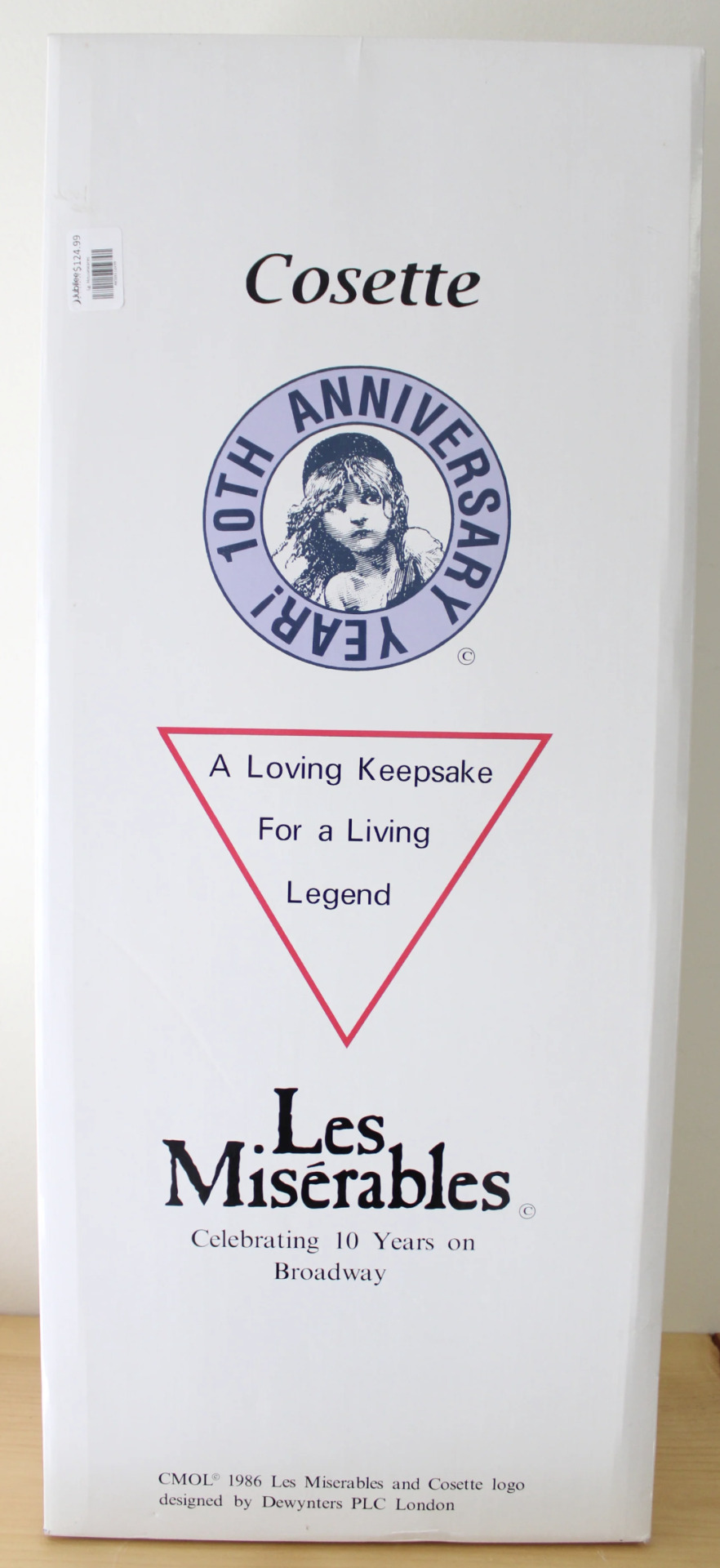Text
I think it's interesting that Valjean only starts getting GOOD at Crime when he's had his big Redemption Realization and started trying to do Good
his former heists? terrible. Awful. He stole One Loaf of Bread, Badly, some tableware, clumsily, and a coin from a literal child, accidentally. He got caught on EVERY ESCAPE, sometimes nigh instantaneously. Crime Skills Level after 19 years in the bagne: Garbage Tier. Absolute Garbage Tier.
But zoom ahead a little to M-sur-M and he's breaking and entering and leaving money like magic! Fooling the world's most suspicious cop! Faking an entire identity like he was born to it! Jailbreaks so smooth and uncomplicated that Hugo won't even tell us about it!
Roll on to him raising Cosette and he's even better! He fakes his own death multiple times to fool multiple authorities and it WORKS! He is faking his identity well enough to be a National Guard AND have (ownership? really good leases?) on multiple properties! He escapes a house full of cops and vanishes entirely, AFTER having been tied up and seriously injured (by himself)! He escapes an ARMY! He forges an entire New New Identity for Cosette! His criminal ways cannot be stopped, so long as he's doing it for a selfless reason!
...I really don't know what to make of all this (why is better at Crimes from a few months out of prison than from all the time he spent with other thieves IN prison? What Changed? Is he just calmer? ) but "Be Selfless, Kick Ass At Crime" is a hilarious Les Mis message that well deserves to keep company with "Lie to authorities always constantly" XD
178 notes
·
View notes
Text
*elaborate red stringboard argument about how different characters in Les Mis are living in different genres and Cosette is Fairy Tale so hard that she changes other people's narrative genres when she brings them in to her life*
249 notes
·
View notes
Text
Oh, how I wish this theatre hadn't been torn down! It was only a short distance from my childhood home.
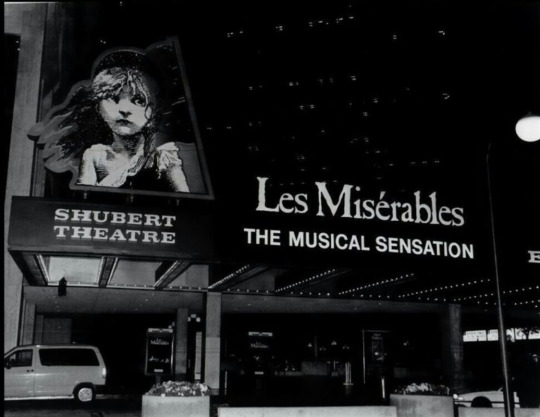
13 notes
·
View notes
Text
The poster would have stood out in and of itself, but they went the extra mile and parodied the names of the original Broadway cast!
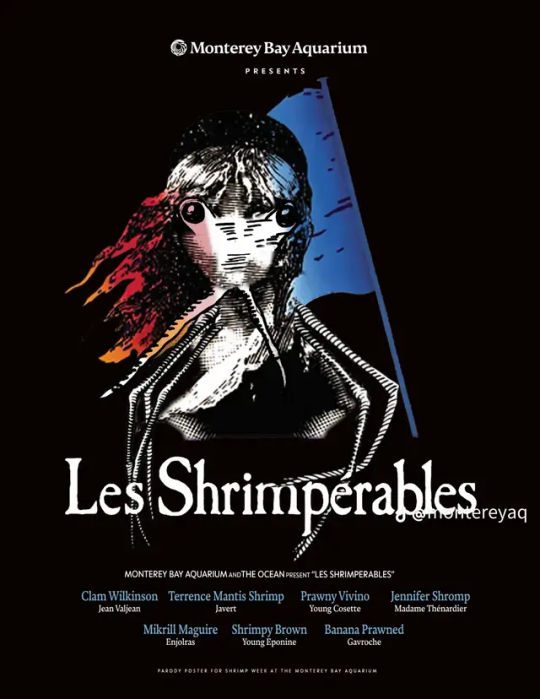
THIS WAS POSTED ON THE OFFICIAL MONTEREY BAY AQUARIUM TIKTOK
857 notes
·
View notes
Text
I saw Les Mis live for the first time the other weekend, and the surprising standout performance for me was Kyle Adams as Grantaire. He is a performer who has obviously read the Brick, and uses all of his stagetime to convey as many aspects of Brick Grantaire as possible; he also reads Grantaire’s love for Enjolras as explicitly gay and romantic (there’s a moment I’ll talk about later where he blows him a kiss.) I was actually surprised by how much he managed to convey in so little time!
Some highlights:
When Enjolras is asking for a “report on the strength of the foe,” Grantaire enthusiastically raises his hand, posturing and gesturing wildly at himself to volunteer. Enjolras casts him a disdainful look like “anyone elSE?” And that’s when Javert jumps in with his “I can find out the truth.” It’s like a small silent version of the Barrier du Maine scene; Grantaire was really giving that “je suis farouche.”
In general, there was this repeated Thing where Grantaire obnoxiously acts out in order to get Enjolras’s attention, and then flails around uselessly whenever he actually has it. Very in character.
Grantaire often goes on uproariously and jokingly about love; then, whenever he’s approached by Enjolras, he doesn’t seem to understand what to do about it.
Whenever Enjolras is singing dramatically about revolution— during Red and Black, Do You Hear the People Sing, and One Day More— Grantaire gazes at up at him with a amazed, awed, and overwhelmed look on his face, sometimes with his hand on his heart.
During Red and Black, there’s a moment where Grantaire “jokingly” caresses Enjolras’s face. Then during Do You Hear the People Sing, Enjolras passes Grantaire by and casually caresses his face; Grantaire acts a bit stunned, as if surprised Enjolras would deign to touch him. Finally, there’s a dramatic “reassuring face-caress” during the gay verse of Drink with Me.
There’s a repeated thing where Grantaire keeps offering Enjolras a bottle of wine, half-jokingly, only for Enjolras to reject it. In the last verse of Drink with Me, after Grantaire finishes his verse and walks away, Enjolras finally accepts a bottle of wine (though another character gives it to him.)
Iirc Grantaire doesn’t join in the fighting initially; he just stares at Enjolras in awe, and then mainly stands by Javert to “guard” him. I mainly mention this because I think Javert and Grantaire are a very funny duo, just as a concept. I think “being forced to listen to Grantaire monologues” is an excellent punishment for Javert.
During Marius’s verse of Drink with Me, Enjolras climbs to the top of the barricade, standing in the light. Grantaire is at the bottom in the shadows, attempting to sleep. As Marius sings about his love for Cosette, Grantaire raises his bottle to Enjolras, and then blows him a kiss. It’s very “let me sleep here until I die here.”
Finally, Grantaire has his "book death." After he spends the entire musical on the fringes being skeptical, he joins Enjolras in the final battle. He climbs up the barricade and says (I was close enough to hear) "Long live the Republic! I am one of them."
I'm genuinely impressed by how much of the Brick characterization he managed to convey with so little time-- some ad-libbing and lots of silent acting moments! It really gave me a greater appreciation of what a strong performer in a musical can do, and how they infuse even 'smaller' parts with lots of nuance and personality.
450 notes
·
View notes
Text
grantaire is the absolute epitome of wanting to be cool and mysterious but having the fatal flaw of being a chronic oversharer
425 notes
·
View notes
Text
Fantine:
At the expiration of two or three months she shook off her shame, and began to go about as though there were nothing the matter. “It is all the same to me,” she said.
Éponine:
“God will bless you,” said he, “you are an angel since you take care of the flowers.”
“No,” she replied. “I am the devil, but that’s all the same to me.”
Hugo's "fallen women" pretending they don't care who they've become or what others think of them.
133 notes
·
View notes
Text
Autism headcanon: Fantine (Les Misérables)
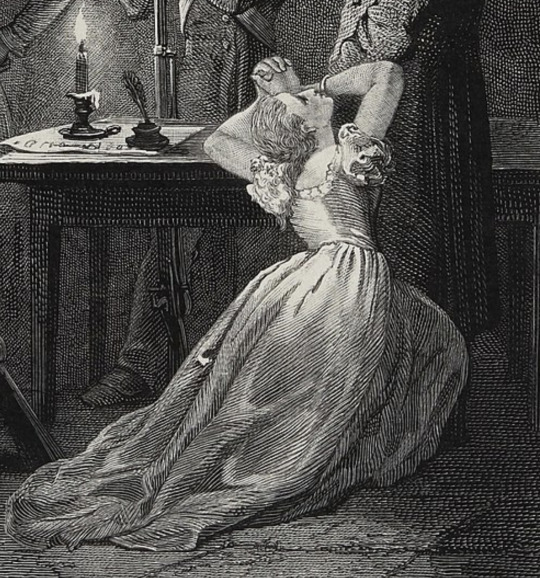
This is just one of many autism headcanons that are possible in Les Misérables. I could view quite a few of those characters as being on the autism spectrum. But this is one that I've never seen other people suggest before, but which rings true to me.
This is based only on Fantine's portrayal in the novel, by the way, not the musical. It would be almost impossible for an actress in the musical to convey all these things.
*By nature, Fantine is quiet, thoughtful, and a dreamer. In her first chapters in Paris, this sets her apart from the other, outgoing and playful grisettes. Even when she's at her happiest, she's more serious and earnest than they are, and Favourite tells her "You always look strange" or "You're always out of sorts," depending on the translation.
*Still, when she talks about something she passionately cares about, particularly the subject of her daughter Cosette, her quietness disappears and she can prattle on and on.
*She's more shy and modest than the other young women of her social class, and doesn't feel comfortable joining them in their bold, flirty games. In Paris, she never lets men other than Tholomyés kiss her, and she refuses to show off her legs by swinging on a swing. In 19th century France, grisettes were more-or-less expected to be coquettish and sexually free – this was how they found men to provide for them – so Fantine is clearly a "different" one.
*She never fits in with the groups of other women she temporarily belongs to. This is arguably one of the main reasons for her tragedy. In Paris, the other three grisettes (especially Favourite) think she's strange, and accuse her of "putting on airs" because she's less flirtatious than they are. They're only "friends" to her because their respective lovers are friends, and after the men leave she loses touch with them. Then, in Montreuil-sur-Mer, she makes no friends among the other factory workers, and depending on the translation, the other women think she either "has ways about her," or, yet again, "puts on airs." Of course this can be explained by the secret she's hiding, but it also mirrors her earlier relationship with Favourite, Dahlia, and Zéphine. The only friendship she ever builds by herself is with her neighbor Marguerite, an elderly woman who serves as her mentor; she never has real friends her own age. It seems that whenever she tries to belong to a group, they label her odd, mistake her reserve for pride, and either casually drift away from her or outright shun her as soon as they have an excuse to do so.
*She can be all too trusting. If she has a tragic flaw, this is it. First she gives both her heart and her virginity to a man who cares neither about her nor about their daughter. Then, even more fatally, she leaves Cosette in the hands of a couple she's only just met, just because their own daughters are happy and well cared for. Taking things too much at face value and trusting too much is a very common pitfall on the autism spectrum.
*In some ways she displays black-and-white thinking. When she's fired from the factory, at first she internalizes society's view of her as a sinner, accepts her firing as justice, and neither protests nor holds it against Monsieur Madeleine. But over the next two years, as she falls deeper and deeper into poverty, she gradually comes to hate Madeleine with all her heart and view him as a monster. So much so that when he saves her from prison, she can't comprehend it: she has to lie to herself that she misheard and that it was Javert who ordered her release just so the world will make sense again. Many of us on the spectrum can relate to that experience of tying our brains into knots to make sense of some jarring new information. Of course, Fantine is far from the only character in this novel with a black-and-white worldview that gets derailed: at least she's not the one who's driven to suicide by it.
*She often tends to be childlike, even after her all her trauma and loss of innocence. Her very name means "childlike" and it fits. For example, after she gets overexcited thinking Monsieur Madeleine has gone to fetch Cosette, and the nuns urge her to lie back down and not talk anymore, she apologizes for having been "naughty" and says that now she'll be "good." And of course there's her tendency to be naïve and too trusting, mentioned above.
*She's very emotionally sensitive, and she seems to have trouble controlling her emotions. In Paris, she comes close to tears at the sight of a horse dying from overwork, which her friends find amusing because to them it's just a fact of life. After giving Cosette to the Thénardiers, she openly cries "as if her heart would break" as she walks out of town (rather than being "seemly" and waiting until she reaches a private place), and when she works at the factory, she sometimes sheds a tear as she thinks of Cosette or Tholomyés, despite being surrounded by other workers. This is one of the "suspicious" details about her that the gossiping women notice. As much as people on the autism spectrum are stereotyped as unemotional, many of us are more sensitive and struggle more with emotional regulation than most people.
*Her attack on Bamatabois when he stuffs the snow down her back is easy to read as a meltdown. Of course anyone who had snow unexpectedly stuffed down their back would scream and probably fight back in self-defense, but Fantine's frightening rage – letting out a "roar," then leaping at Bamatabois "like a panther," beating him, kicking him, clawing at his face with her nails, howling and swearing all the while – goes far beyond self-defense. Now this might be explained as all the helpless rage that's built up inside her for several years finally reaching a breaking point. She might also be drunk – her voice is described as "roughened by brandy," though I don't know if by that Hugo meant that she's drunk in this scene, or just that her voice is roughened by how much she's been drinking in general. Still, to those of us who have had meltdowns, it looks familiar.
*She can be sadly irresponsible with money. When she first gets her job at the factory, she buys furniture on credit, thinking she'll soon earn enough to pay for it. As a result, after she's fired, she can't leave town and find work elsewhere because of her debt. For those of us on the spectrum, it can be hard to understand exactly how money and credit work, let alone mange them by ourselves.
*At the same time, she's memorized the routes between Montreuil-ser-Mer and Montfermeil where Cosette is, and she calculates the distance out loud to herself while she's delirious with fever. While any mother might presumably do this, people on the autism spectrum do tend to have a knack for calculating and memorizing things.
Now, of course, there's no possible way Victor Hugo, writing in the 19th century, could have meant for Fantine to be autistic. Most of the above can be explained by the fact that she's young, an orphan, and uneducated, that she's chronically ill throughout most of her storyline, and that her mental health is damaged by all her trauma. There's also the Doylist argument that Hugo was bad at writing women, which could also explain why she seems "off" at times.
But the realization that Fantine's misery and death are caused not only by society shunning her for her sexual "sin," but by her own tendency to be too trusting, and even more so by her failure to fit in or to play by all of society's many and sometimes contradictory rules, strikes a chord for me. It's terrible to imagine how many autistic women without support have probably suffered in the same ways Fantine does. Hopefully, the more people understand the spectrum, the more support systems there will be.
#autism headcanon#les miserables#les mis#fantine#autism#autism spectrum#tw: violence#tw: suicide mention
14 notes
·
View notes
Text
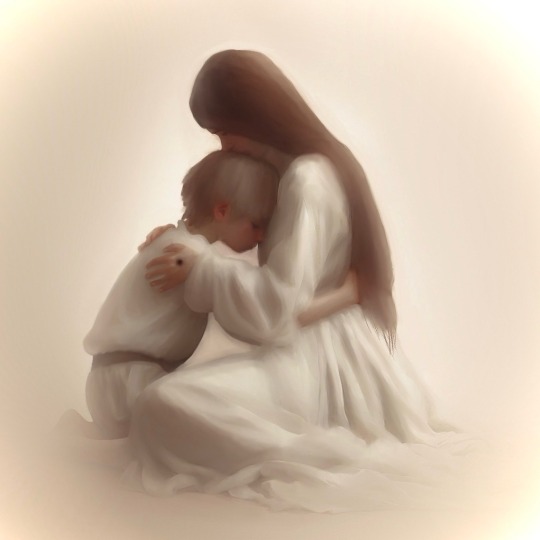
i like to imagine the first thing gavroche does in the afterlife is immediately go find his sister
125 notes
·
View notes
Photo
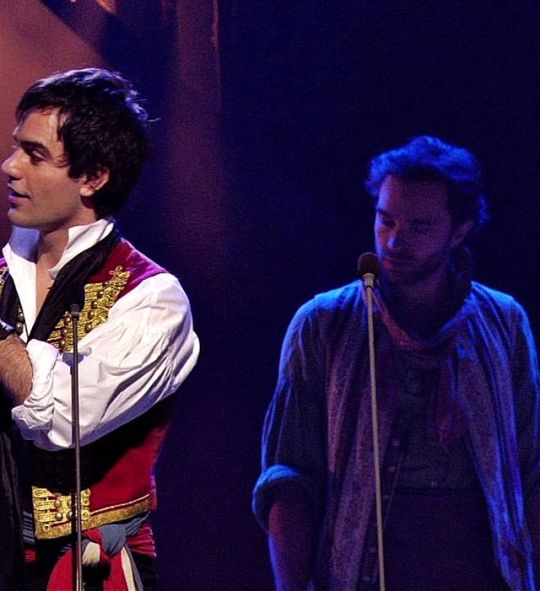
Grantaire, being in Enjolras’ shadow
4K notes
·
View notes
Text
On my other Tumblr blog I posted a similar poll about Elphaba in Wicked, so I thought I would see how people think Éponine should be cast too.
Éponine's musical actresses have always traditionally been beautiful, and this is done on purpose – for many years, the official casting call for the character described her as "very pretty."
Some fans complain about this and view it as just another way that the musical overly romanticizes her character.
But I understand the choice. Hugo makes it very clear that Éponine could have been beautiful if she wasn't poor and malnourished. If they cast a girl who wasn't pretty, then audiences might think it was just bad luck that kept Marius from loving her. But if under her rags and dirt smudges she's just as beautiful as Cosette, then audiences realize that it's only her social class and her upbringing by the Thénardiers that set her apart from Cosette. It's clear that Marius, or some other, equally respectable young man, could have loved her if only she weren't a street waif.
Still, there's a big difference between Hugo's "she could have been beautiful, but her squalid life has given her a bony figure, yellowish skin, rotten teeth, etc." and a stunning actress who's just dressed in rags and has a dirt smudge on her face. Maybe when she's cast too beautiful, it becomes too hard to believe that Marius wouldn't be attracted to her, class difference or no class difference. And if the point of her character is to create sympathy and empathy for a person whom society abuses and ignores, then maybe it's better for her to look like a plain, average homeless girl on the streets, not like a classic beauty who's just been dirtied up.
Of course in musical theatre, actresses who aren't conventional beauties are almost unheard of outside of character roles. Just look at the various casts of Funny Girl: part of the whole point is that Fanny Brice became a star despite her homely looks, and the real woman genuinely was homely, yet from Barbra Streisand to Debbie Gibson to Lea Michele, she's usually cast as a beautiful woman who just has a fairly big nose. The one time an actress who can honestly be called "homely" took on the role, the critics panned her. (You can't convince me that the backlash against Beanie Feldstein was just about her weak singing and not fatphobia too.)
Thoughts?
38 notes
·
View notes
Text
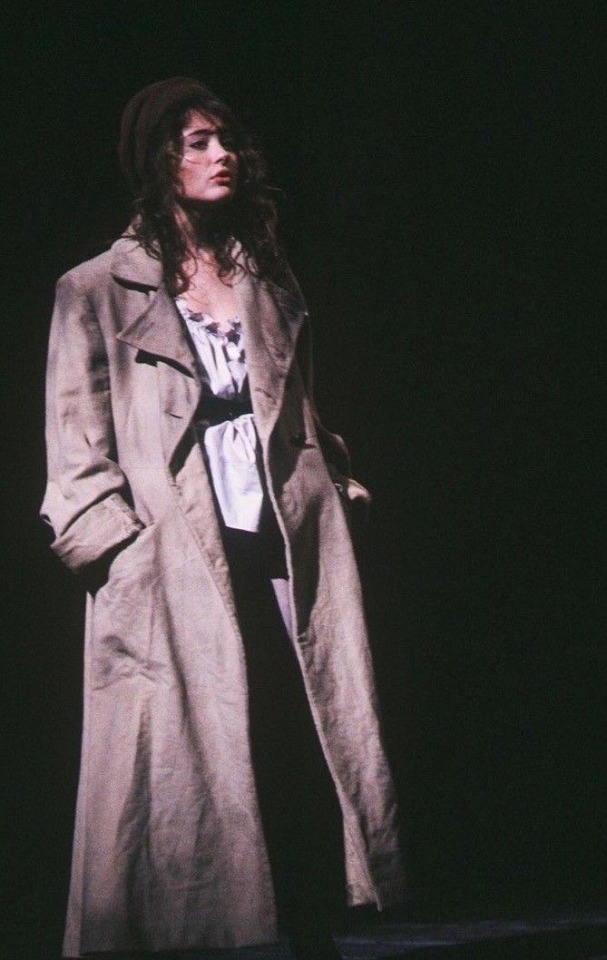
this popped up on pinterest..i have never been so captured by an image..my jaw actually dropped..i am enraptured..like…oh my gosh…oh my gshoh…..
163 notes
·
View notes
Text

10 notes
·
View notes
Text

22 notes
·
View notes
Text
I know that most viewers of this will be focused on Grantaire... yes, all the Grantaire business is good... but...
The fact that when Grantaire grabs and hugs Marius after "A Little Fall of Rain," Marius is trying to run after the boys who carried Éponine's body away because they left her hat behind. And he keeps holding out the hat in the direction they went, even as Grantaire hugs him. It's as if he's melting down like Vada at Thomas J.'s funeral in My Girl: in the same tone as her "Where are his glasses? He can't see without his glasses!" I can imagine this Marius sobbing "Wait, you forgot her hat! She'll be cold without her hat! Put her hat on!"
This is the best German production I have found so far and it does many things right, such as Grantaire having long hair
#les mis#les miserables#berlin#germany#2004#marius pontmercy#eponine#enjolras#gavroche#grantaire#tw: death
441 notes
·
View notes

